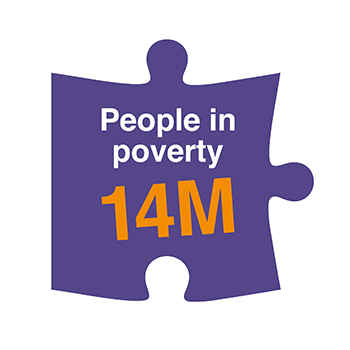News and views
Go back

A small matter of hope?
Fay Selvan, Big Life CEO
Soon after New Year, I heard Fraser Nelson (Editor of the Spectator) talking on BBC Radio Four about how life is getting better for the average human, but due to the deluge of negative press, we struggle to believe it. What we need, he argues, is a more positive outlook.
It’s a nice thought. And it is true, to a certain extent. Over the last century there are many statistics that show that poverty worldwide is decreasing; more people get an education and life expectancy is increasing. And for some people in this country – possibly Fraser Nelson himself – this mirrors their life experience.
But it’s a different story if you look at the data for the last ten years (not the last century) and the lives of the poorest people living in the UK.
According to the Institute For Fiscal Studies, real wages have actually declined by 3.2% since 2008, with individuals under 30 seeing the largest reduction of 7.2%.
Over the past five years, child poverty has increased by half a million to 4.1 million. Pensioner poverty is increasing, and is currently at 11%. 48% of individuals living with a disability live in poverty.
Food bank use has increased by 48% over the past two years. In the last year, 1.6 million food parcels were given out by food banks.
Local Authority spending on family services has reduced by 40% over the last ten years, contributing to a 20% rise in care applications. In the three years leading up to 2017, infant mortality rates have risen, reversing a long-standing downward trend. The infant mortality rate for Greater Manchester currently stands at 4.4 per every 1,000 births. Manchester has seen a 40% increase in infant mortality rates in the last decade. 2019 also saw the loss of the UK’s ‘measles free’ status after childhood immunisation rates have decreased year-on-year.
The amount that councils are spending on support for single homeless people in England has fallen by 53% between 2009 to 2018, meaning almost £1billion less is being spent to support vulnerable people. The number of rough sleepers in England has doubled, and is currently an estimated 4,751 people. The number of homeless people dying on the streets has increased by 22% from 597 in 2017 to 726 in 2018.
80% of schools will receive less funding per pupil in real terms in 2020 compared to 2015. This will mostly impact schools who have high levels of disadvantage.
In the NHS, annual budgets rose by an average of 1.5% between 2010 and 2019, compared to an average of 3.7% since the NHS was established. Consequently, targets are failing to be met, with 55% of people waiting longer than 18 weeks for treatment. A&E waiting time targets have not been met since 2013/14. The number of GPs per 10,000 registered people peaked in 2009 at 6.91 but has since decreased to 6.13 in 2018. In Greater Manchester and Lancashire, this figure is just 4.6 per 10,000 registered people.
Between 2013 and 2017, funding for drug and alcohol services reduced by 15%, while drug-related deaths have been rising. In 2018, there were 4,359 drug-related deaths – an increase of 16% since 1993.
Funding for new social housing has decreased, with the government focusing on private renting and shared ownership. The National Housing Federation estimates that 145,000 new social homes need to be built every year to keep up with demand. Housing for the poorest is becoming less affordable. The cost of rent rose 60% faster than wages between 2011 and 2017, with people on the lowest incoming spending 75% of their earnings on housing costs.
The number of families that are statutorily homeless has increased by 42% since 2009, with 71% of local authorities reporting increases in 2019. In Greater Manchester there are 1,500 households living in temporary accommodation, with an average wait of two years for a permanent home. The number of homeless children is rising, with an estimated 131,000 in 2018 – a 59% increase in the past five years. In Greater Manchester this increase is 177%.
Inequality continues to grow. The richest 10% of households in the United Kingdom currently own 44% of wealth, whereas the poorest 50% own just 9%. Geographically, wealth is uneven, with the average household wealth in the South East being £387k, compared to £165k in the North West.
So, do I think the problem is that the press needs to be more positive about the state of the nation?
No. But I don’t think we should just be depressed and hopeless either.
The UK was one of the first countries in the world to introduce universal free healthcare (the NHS) in 1948 – an institution we are rightly proud of. It was the seventh country in the world to give women the vote in 1918. We have an ability to be bold if we want to be.
Being gay was illegal in our country until 1967. Today, we have same sex marriages and most people don’t think homosexuality is wrong. We have a track record of choosing a more progressive path.
If we don’t want to live in a country where inequality is growing and where only some people live longer better lives, then we need to choose to do something about it. We don’t need to ignore reality and hope that everything is getting better. We need to look at what is happening face on and know that if we choose, we can do better.
